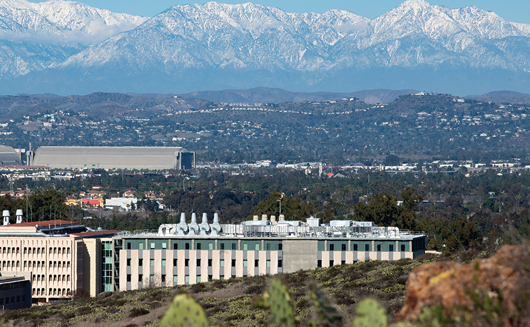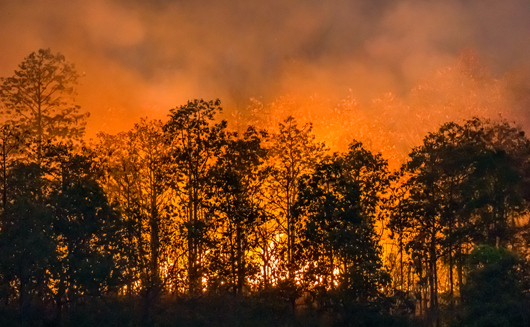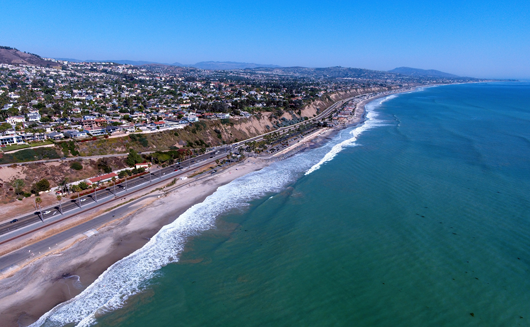
UCI launches Environmental Humanities Research Center
The growing field of environmental humanities is putting down roots at UCI, home to the newly founded Environmental Humanities Research Center, which will bring together scholars and the public in examining today’s environmental crises from humanistic perspectives.
The EHRC brings together years of environmental humanities research at UCI, including the work of the Environmental Humanities Research Cluster. Established in 2021 and co-directed by Art History Chair James Nisbet and Visual Studies Ph.D. student Aaron Katzeman, the cluster organized workshops and shared relevant research from faculty across disciplines in the School of Humanities. Its rapid transition to center status is a testament to the urgency inherent in the environmental humanities.
The environmental humanities bridge the sciences and humanities to form more nuanced understandings of today's environmental crises. Environmental humanities scholars bring critical analysis, cultural attunement, storytelling, historical context and a deep understanding of human beliefs and motivations to these multifaceted issues.
Getting to the root
“The present geological era created by humans – called the Anthropocene – and its accelerating global temperature rise that has fueled ever-increasing climate-induced catastrophes pose problems that must be addressed by diverse human solutions,” said Nisbet, director of the EHRC. “Cutting to the core of the School of Humanities mission to contribute ideas that matter, the environmental humanities address nothing less than the most pressing global existential issue of our lifetime.”
The emergence of the environmental humanities has been spurred by the rapid development of climate change and the increasing recognition among scholars and activists that environmental science and environmental justice are integrally connected.

"Environmental justice recognizes that the root cause of climate change and other environmental issues cannot be disentangled from larger colonial structures, class society, racial injustice and gender inequality,” Katzeman said. “The environmental humanities provide a helpful methodological framework through which we can think about these concerns conjointly, particularly how they are materialized in works of cultural production."
Drawing lessons from nature
In addition to the Environmental Humanities Research Cluster, the EHRC builds on a record of other innovative environmental humanities undertakings at UCI.
In 1994, the UC Humanities Research Institute (UCHRI), in coordination with Irvine humanities scholars, hosted a conference titled “Reinventing Nature” that was influential in what later became legible as the environmental humanities.
Formed in 2014 by Nisbet and Associate Professor of Art History Lyle Massey, the “Desert / Environment / Structure” research cluster culminated with the publication of The Invention of the American Desert: Art, Land, and the Politics of Environment (University of California Press, 2021). The cluster’s ideas served as a launching point for additional environmental humanities study within the school.
Starting in 2019, Katzeman and Visual Studies Ph.D. students Marianna Davison and Scott Volz co-founded the Climate Futures Collective (CFC) research group to engage critical environmental humanities scholarship across disciplines on campus. The group’s name alludes to the history that UCI scientists played in the initial detection and eventual regulation of chlorofluorocarbons (CFCs), one of the prime contributors to ozone depletion. The CFC continues to regularly host thematic reading groups and sponsor related events.
As part of the UCI Humanities Center's initiative on Oceans during the 2020-21 academic year, Director Judy Tzu-Chun Wu organized a faculty reading group that considered the oceans and the environment more broadly. Along with the efforts of the CFC, the reading group paved the way for the Environmental Humanities Research Cluster.
Collaborations among scholars of Japanese history, literature and culture have broadened the school’s focus. In 2021, humanities scholars organized “The Alpine Archipelago: Surveying Japan from the Timberline,” a virtual conference that explored the place of mountains in Japanese history, literature, film, religion and popular culture. Supported by a 2018-2022 Japan Foundation Institutional Grant for Japanese environmental humanities, it included contributions by Associate Professor Margherita Long and Assistant Professor Jon Pitt in the Department of East Asian Studies and Associate Professor David Fedman in the Department of History.
Facing the crisis
Intersectional and interdisciplinary research is only one half of the center’s vision. The EHRC hopes to engage other scholars, classrooms and the public – through dialogue among faculty and graduate students at UCI and through participation in climate-based initiatives across the UCI campus, UC system, universities and research centers worldwide. It seeks to integrate critical environmental studies into humanities classrooms and offer students greater opportunities to work with faculty and community partners on environmental humanities research. The center plans to sponsor events, workshops, guest lectures and more, to inform the public about emerging research and catalyze change that could help us mitigate and adapt to the climate crisis.
“This is not the time to sit on our hands or to be working in isolation,” Nisbet says. “We will need a major coalition of contributors to imagine and realize just climate futures, and the Environmental Humanities Research Center will be a hub for staging those conversations and making the connections we’ll need to be able to work more powerfully together.”





